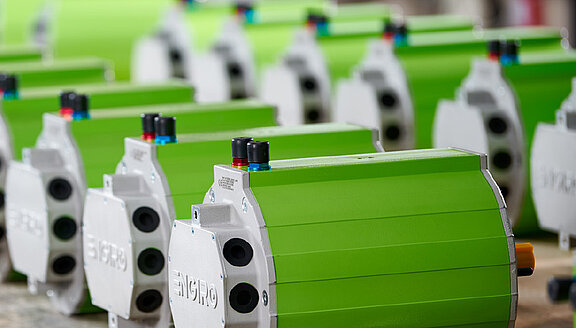ENGIRO Code of Conduct
Preamble
Innovations are not conceivable in our society today without the electrical and digital industry (ZVEI) and mechanical and plant engineering (VDMA). Small and medium-sized companies from both sectors are particularly successful at creating products and applications that offer pioneering solutions in areas such as climate protection, the conservation of resources and safe workplaces. They also contribute to societal and economic development around the world. Actions here are consistent with the current legal framework and a basic understanding of responsible and ethical behaviour as formulated in this joint Code of Conduct.
1. Basic understanding
This Code of Conduct is based on a shared conception of socially responsible company management as defined by the following guiding principles.
We, the undersigned company,
ENGIRO GmbH, Avantisallee 51, 52072 Aachen
accept responsibility for the consequences of our business decisions and activities in respect of the legal, economic, technical, social and environmental implications as far as possible within our available scope of action. We thus contribute to the societal and economic development of the countries and regions in which we operate.
Our actions are consistent with the relevant legal regulations. We are guided by ethical values and principles, in particular integrity and honesty, as well as respect for the dignity of human beings as set out in the principles of the Universal Declaration of Human Rights of the United Nations, the OECD Guidelines for Multinational Enterprises, the Core Labour Standards of the International Labour Organisation and the United Nations Guiding Principles on Business and Human Rights.
This Code of Conduct defines the basic principles of our actions, and we actively demand that it is observed by our employees worldwide. Its standards apply in all branch offices and business units within our company.
We expect the same basic understanding from our business partners. It is not intended to constitute a basis for third-party rights.
2. Compliance with legislation
It is a matter of course for us that we will comply with current laws and other legal requirements in the countries in which we operate. In cases where local laws and regulations are less restrictive, our actions are guided by the principles of this Code of Conduct. Where there is a direct conflict between mandatory local law and the principles contained in this Code of Conduct, the local laws shall take precedence. Nevertheless, we endeavour to comply with the content of this Code of Conduct.
3. Integrity and compliance
We have implemented suitable compliance1 measures so that the following areas are covered appropriately:
3.1 Corruption
We do not tolerate corruption, bribery or blackmail; they impede fair competitive conditions. Gifts made with the intention of influencing business decisions or which could give the appearance of doing so or to obtain some other undue advantage are neither promised, offered, granted, requested nor accepted in our business relationships. Nor do we allow these to be promised to us. Especially strict standards must be applied when dealing with people for whom particular rules apply under criminal and liability law (e.g. public officials).
3.2 Fair competition
We operate in compliance with national and international competition and anti-trust legislation and do not participate in price agreements, sharing markets or collusion in respect of customers, markets and bids.
3.3 Prevention of money laundering
Money laundering is the term used for bringing money obtained illegally or from illegally acquired assets into the legal financial and economic system. We comply with our legal obligations to prevent money laundering and do not participate in transactions that serve to disguise or integrate criminal or illegally acquired assets.
3.4 Protection of informationen and intellectual property
We protect confidential information and respect intellectual property; transfers of technology and know-how must be made in a way that protects intellectual property rights, customer information, business secrets and information that is not in the public domain. We observe the current laws to protect business secrets and treat our business partners’ confidential information accordingly.
3.5 Data protection
We process, store and protect personal data in compliance with statutory regulations. Personal data is therefore treated confidentially and only collected for legal, previously defined purposes in a transparent manner. We only process personal data if it is protected against loss, modification and unauthorised use or disclosure using appropriate technical and organisational measures.
3.6 Export controls
We undertake to comply with legal standards relevant to export controls – including but not limited to approval requirements, export bans and support bans – in the course of shipping and exporting our goods.
3.7 Avoidance of conflicts of interest
We avoid internal and external conflicts of interest which could illegitimately influence business relationships. Where this is not successful, we disclose these conflicts.
4. Health and safety
We protect our employees’ health by taking suitable measures in relation to health and safety at work (e.g. the implementation of a company health and occupational safety management system) that provide appropriate cover in the following areas:
- Compliance with current laws and guidance set out in international standards relating to health and safety at work2;
- Suitable workplace design, safety regulations and provision of suitable personal protective equipment;
- Implementation of preventive checks, emergency measures, an accident reporting system and further suitable measures for continuous improvement;
- Provision of access to adequate quantities of drinking water and access to clean sanitary facilities for employees.
We ensure that our employees have received adequate instruction.
5. Remuneration and hours of work
Remuneration is based on current laws and, if applicable, current binding collective agreements and is supplemented by the relevant national legislation on minimum wages. Employees are given clear, detailed and regular information on the composition of their remuneration.
We comply with current laws and (international) working standards3 in respect of the maximum permissible working hours and ensure that
- working time, including overtime, does not exceed the relevant legally permissible maximum limits;
- the hours worked per week, including overtime, do not exceed 60 hours per week, even in exceptional circumstances and even if no such stipulations exist;
- employees have at least one full day per calendar week free.
6. Observance of human rights
We pay attention to and support compliance with internationally recognised human rights and
- respect the personal dignity, privacy and personal rights of each individual;
- protect and uphold the right to freedom of speech and freedom of expression;
- do not tolerate unacceptable treatment of employees such as physical and psychological hardship, sexual and personal harassment or discrimination.
6.1 Prohibition of child labour
We do not tolerate any child labour4. We do not employ any employees who cannot prove that they are at least 15 years old, and we require proof of age to be submitted. For countries which fall within the exception for developing countries according to ILO Convention No. 138, the minimum age can be reduced to 14 years. We do not hire employees for dangerous work who, according to ILO Convention No. 182, cannot prove that they are at least 18 years old.
6.2 Prohibition of forced labour
Forced labour, modern slavery or comparable acts that involve the deprivation of liberty are forbidden.5 All work must be voluntary, and it must be possible to end the employment relationship.
6.3 Freedom of association and collective bargaining
We respect the right of employees to freedom of association, freedom of assembly and to engage in collective bargaining and pay negotiations6, providing this is legally permissible and possible in the relevant country in which we are operating. If this is not permissible, we look for appropriate compromises for our employees.
6.4 Promotion of diversity, equal opportunities
We encourage equal opportunities and do not tolerate discrimination.7 We treat all people equally regardless of gender, age, skin colour, ethnic origin, sexual identity and orientation, disability, religious affiliation, worldview or other personal attributes.
7. Environment, energy and climate protection
We act in compliance with current legislation and are guided by international standards8 in order to minimise negative impacts on the environment and continuously improve our activities in respect of environment and climate protection.
All employees are made aware of environmental issues and the necessary training is offered. We have implemented appropriate environmental protection measures (e.g. the implementation of a company environmental management system) that cover the following topics appropriately:
- Setting objectives, defining and implementing measures and ensuring the continuous improvement of these;
- Environmental aspects such as the reduction of CO2 emissions, increasing energy efficiency, using renewable forms of energy, safeguarding the quality of water and reducing water consumption, safeguarding air quality, encouraging resource efficiency, reducing waste and disposing of waste in the proper way and responsibly handling substances that are dangerous to human beings and the environment.
8. Dealing with conflict minerals
We exercise the necessary care to take measures to avoid using conflict minerals in our products in order to prevent human rights violations, corruption and financing armed groups or similar via this route.
9. Supply chain
We expect our suppliers to comply with the principles of this Code of Conduct or to apply comparable codes of conduct. Furthermore, we encourage them to implement the criteria in this Code of Conduct in their own supply chains.
We reserve the right to systematically apply this Code of Conduct with our suppliers and to carry out checks as warranted. This may take the form of questionnaires, assessments or audits.
Should this cause doubts as to whether this Code of Conduct is being followed, the supplier is requested to take suitable measures to counter this and to notify its contact in our company of the course of action. If required, the cooperation arrangement will be ended.
10. Consumer interests
Where the interests of consumers are affected, we follow consumer protection provisions and appropriate sales, marketing and information practices. Special attention is paid to groups that require particular protection (e.g. young people or pregnant women).
11. Execution and implementation
We make suitable and reasonable efforts to continuously implement, document and apply the principles and values in the Code of Conduct. All employees are made aware of what this Code of Conduct contains and receive training on relevant topics as required. Violations of the Code of Conduct are not tolerated and can have consequences under employment law.
11.1 Communication
We communicate openly in dialogue with employees, customers, suppliers and other interest and stakeholder groups regarding the requirements of this Code of Conduct and its implementation.
11.2 Information on infringements
We offer our employees and business partners access to a protected mechanism that will allow them to confidentially report possible violations of the principles of this Code of Conduct.
If you would like to pass on any information, please contact the following person/office directly or anonymously.
Compliance, compliance@~@engiro.de
12. Signing
Aachen, 19.10.2022
Jan Werner, CEO
ENGIRO GmbH, Rathausstr. 10, 52072 Aachen
1 Compliance refers to observance of legal regulations, regulatory standards, voluntary self-imposed commitments and internal guidelines.
2 See ILO work and social standards (ILO Guidelines on Occupational Safety and Health); SA 8000 Social Accountability or ISO 45001 Occupational Health and Safety Management, etc.
3 ILO Convention No. 1 (Hours of Work (Industry) Convention), 1919)
4 ILO Convention No. 79, 138, 142 and 182
5 ILO Convention No. 29 and 105
6 ILO Convention No. 87, 135 and 154
7 ILO Convention No. 111
8 ISO 14001 and Standards of OECD Guidelines/COP21

